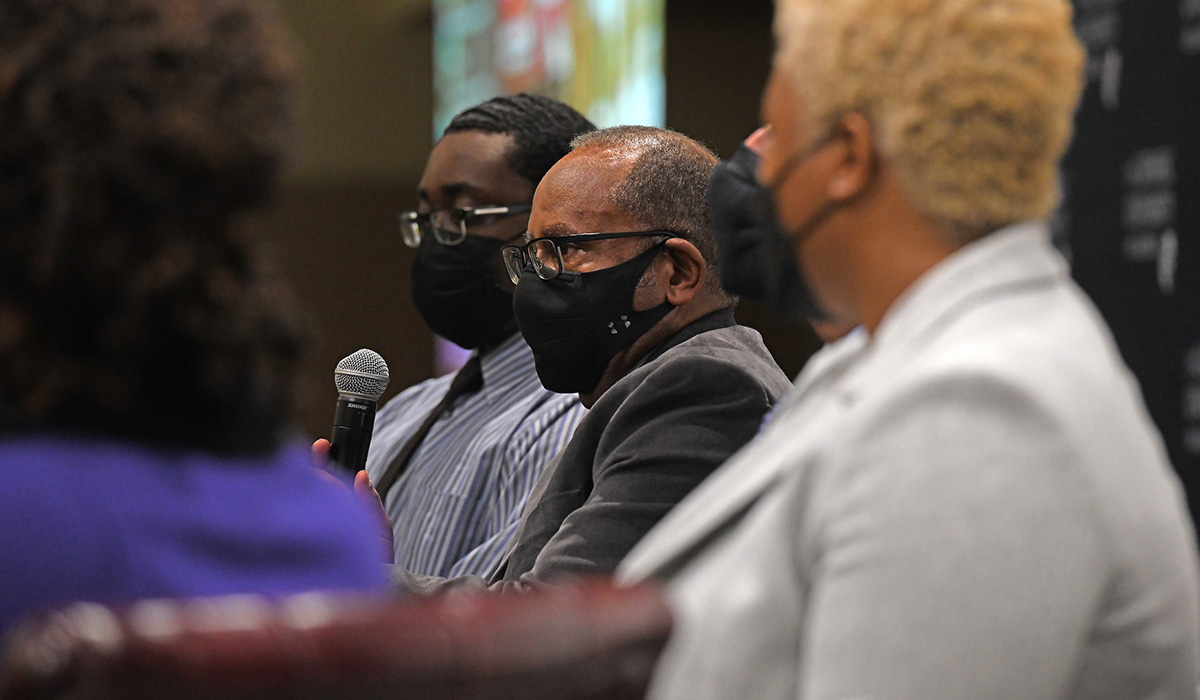

Several hundred members of the University community gathered Nov. 17 in the Pryzbyla Center for the release of the Sister Thea Bowman Committee Report. Named for the first Black member of the Franciscan Sisters of Perpetual Adoration, the report is the culmination of a year’s work to address the sin of racism in our midst and is intended to guide the University in fulfilling its commitment to embrace and reflect the racial and ethnic diversity that enriches our Church, city, and nation.
Inspired by her Catholic faith, Sister Thea was a champion of social justice, particularly for Black Catholics. She completed her master’s and doctoral degrees at Catholic University and today is a Servant of God, whose cause for canonization as a Catholic saint is underway.
The committee, chaired by Regina Jefferson, professor at the Columbus School of Law, included five subcommittees: academic affairs, community building, external affairs, personal formation, and workforce development. Its charge was both foundational and fundamental: to make recommendations regarding racial equality on campus.
Among the report’s 51 recommendations, meant to ensure the University’s culture, values, and behavior are aligned with its Catholic mission, are those intended to address structural barriers to inclusion and equality, such as focusing more intentionally on recruiting and retaining diverse students, faculty, and staff. Other recommendations focus on implementing more diverse academic programs, strengthening support for students of color, and creating solidarity through cultural awareness, dialogue, and listening.
Four of the committee’s 27 members joined Jefferson on the dais on the 17th, as well as a student body representative, for a panel discussion cosponsored by the Office of the President and Student Government Association (SGA).
"It was a true honor for Student Government to partner with the Office of the President to host this event and celebrate the official release of the Sister Thea Bowman Report, a report crafted through countless hours of hard work and dedication from individuals in every corner of this University,” said SGA President Abby Anger. “This report and its recommendations are of very special significance for our community - as these recommendations will guide us to better embrace the full and unique human dignity of our fellow brothers and sisters in Christ."
The evening began with prayer, as Emmjolee Mendoza-Waters, director of Community Engagement, Social Justice and Catholic Social Teaching Initiatives, called upon the University community to strive “to live out a love that requires justice.”
An alumna of the University, Mendoza-Waters was a member of the community building subcommittee and spoke before the evening began of “looking back on my experience as a minority student” on campus and of her hopefulness about what might come of the report’s recommendations. “We’re naming things, and that’s important. Now we’re going back to the community to listen and authentically move forward with our students in conversation.”
It was clear that the participants see that the report is intended to be a living document.
“It comes down to institutional fortitude and the willingness to prioritize this,” said Sean Sullivan, director of Athletics and a member of the external affairs subcommittee. “The way we engage others is to prioritize this work as an institution. We have to be willing to ‘go there’ with one another. And if we walk the walk and talk the talk, it will start to grab hold and take root.”
Mel Williams, associate dean of engineering and special assistant to the president, with responsibility for implementing the report’s recommendations, reinforced the University’s commitment.
“We have the will to move forward and get to a better place,” he said. “You don’t know what you’re going to get when you bring up the topic of race relations in America. But the people who experience this will become disciples of progress going forward.”
The committee was created in late summer 2020, following months of national upheaval over racial incidents, an incident on campus, and awareness that the University is not immune from racism. For members of the committee, the process was a reminder that many of the answers lie within.
Over the course of the last year, “We had the realization that often the infrastructure was already there, but we needed more resources or structure to implement our recommendations,” said Jada Haughton, a student at the Columbus School of Law and president of the Black Law Students Association. She was also a member of the academic affairs subcommittee.
“We saw how much diversity there is already in the community,” Haughton said. “Embracing that and all that it brings to it creates an opportunity for conversation.”
“Our task today and every day is to grow in wisdom,” said President John Garvey in his opening remarks. “The work of this committee set us on the right path. Its recommendations help us better understand our weaknesses and the steps we should take toward building a more welcoming, more inclusive, more just campus.”